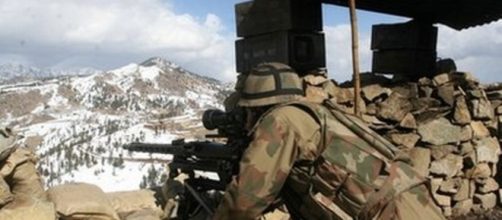Pakistan's war on terror is the case study for the academicians, security experts, intellectuals and think tanks. With limited resources and presence of a prospective external threat, Armed Forces defeated almost sixty horrific global terrorist outfits in one of the most difficult terrains of a world. Unfortunately, success story is not presented as the tale of accomplishments, but always subject to undue criticism
1 Coherent and systematic strategy was the core weapon
Despite the sophisticated technology and unlimited resources, United States is still unable to pack the anti-terror operations in Afghanistan, Yemen, Iraq and Libya.
France is busy in curbing terrorism in Mali while China is fighting a similar war in East. All of the above mentioned countries lack the continuous systematic and coherent strategy because the enemy is not conventional state military, but hidden guerilla groups mainly composed of the indigenous population. With the help of tribesmen and civil administration, Pakistan developed a systematic strategy by breaking down grand objective into short-term strategic and military goals. Appropriate time was chosen to initiate military operations in different areas after getting public and democratic support. The local population was facilitated and supported in fleeing the operational areas.
2 Public support was always recognized as pre-requisite of success
In the beginning, Pakistani population was reluctant to accept the militancy as the fundamental threat to the security and stability of Pakistan. After the establishment of democratic government and Peshawar school tragedy, whole nation supported armed forces in the anti-terrorism drive.
Armed forces head General Raheel was leading from the front while the military was enjoying the popular support on the domestic and international level. The morale of armed forced had been boosted by the extensive public support, media coverage and extensive engagement of military leadership on personal as well as professional level.
The military was once criticized for political interference in the democratic system, but afterward, the military was seen as the only functional and patriotic organ of the state by common masses. A frequent portion of the public opinion was also formulated by the media wing of armed forces known as ISPR. During that time, public vehicles and transportation trucks were carrying large portraits of General Raheel due to the success of operation Zarb-e-Azab.
Pakistan military has undergone the smooth transition of leadership while the war on terror has entered the final stage. Militant organizations have been compelled to leave Pakistan as confirmed by leading western media organizations. Amid the wave of criticism, contributions and sacrifices of Pakistani armed forces should be appreciated on all forums.
Pakistan is always criticized for supporting Haqqani network and LET, but house arrest of Hafiz Saeed and across the board cleansing of North Waziristan is a manifestation of the will of the Pakistani military to act against terrorism. Pakistan has lost 16,000 army men including top military brass and chapter of valor and commitment is still not closed.

